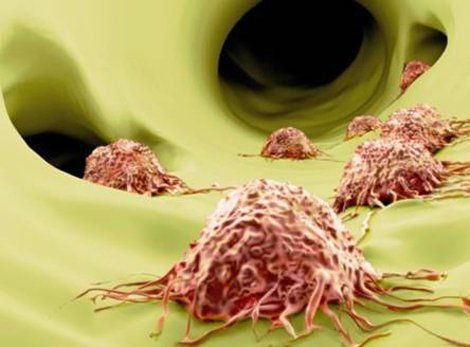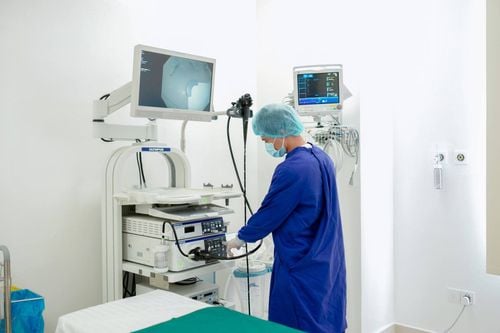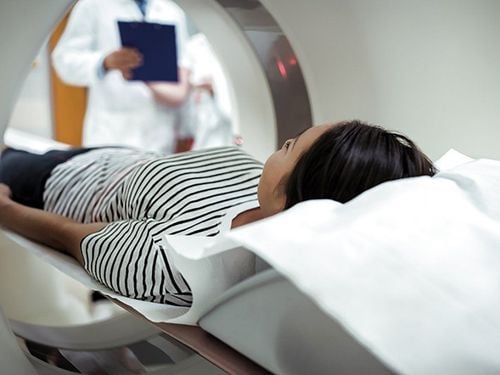This is an automatically translated article.
Article written by Dr. Nguyen Hong Thanh - Researcher - Vinmec Institute of Stem Cell and Gene Technology
National University of Singapore (NUS) researchers have discovered a new personalized tool to detect cancer, predict survival and drug response to immunotherapy. . This tool is designed as a scorecard, to be used with a blood sample obtained from a patient (also known as a liquid biopsy sample).
“Scorecard” named by the team as “Tumor Index – TMI” works based on sequencing analysis of 29 extracellularly released genes. In a series of studies, the NUS team found that 29 of these genes were found to be a repeat factor in non-small cell lung cancer (NSCLC) patients, accounting for 85% of all cases. number of lung cancer cases.
Research done by Prof. Lim Chwee Teck and Dr. Lim Su Bin and colleagues from the Department of Biomedical Engineering at NUS. GS. "Tumor Index - TMI" can be used in conjunction with liquid biopsies, which is less invasive and less painful for the patient, says Lim. Because the test only requires a peripheral blood sample rather than a biopsy at the tumor site, the test may be done more frequently during treatment, providing doctors with information about the level of cancer. response to therapy in real time. Tissue biopsies are usually performed at the beginning and end of treatment, while liquid biopsies can be performed frequently, allowing doctors to more effectively monitor treatment progress. This is a huge step forward in personalizing cancer treatment and ensuring better treatment outcomes."
To develop and test the accuracy of the Tumor Index Scorecard, the research team analyzed analyzed sequencing data from more than 30,000 biopsies of cancer patients and performed parallel analyzes on more than 30,000 of these biopsies, showing that tumor index was strongly associated with the number of mutations variables, tumor histopathology and the ability to predict the patient's treatment outcome".

1. Cancer diagnosis
The team at NUS used shared published data for healthy people and cancer patients to analyze the Tumor Index Scorecard – TMI. The results showed that the TMI tumor index in cancer patients was higher than in healthy people. Therefore, the research team believes that, based on the TMI tumor index, cancer patients can be identified.
The research team also performed sequence analysis of 29 genes associated with 11 common cancer types: lung cancer, pancreatic cancer, prostate cancer, kidney cancer, stomach cancer, and lung cancer. colon cancer, ovarian cancer, breast cancer, liver cancer, bladder cancer and melanoma. The team found that the Tumor Index (TMI) score could distinguish between cancer and normal tissue, and that each cancer type would have a unique Tumor Index.
Up to now, Tumor Index can reliably diagnose lung cancer patients, but the remaining 10 cancer types need to be tested.
2. Predicting the effectiveness of cancer treatment
The team also showed that the Tumor Index - TMI can be used to predict a patient's response to cancer therapies, such as immunotherapy. Immunotherapy is a therapy that uses the body's own cells to attack cancer cells as a form of cancer treatment. Immunotherapy is more recommended than chemotherapy, as it is less invasive and has been shown to be more effective.

3. Predict cancer survival and recurrence rates
Cancerous tumors can grow and metastasize to different parts of the body or recur if treatment is not successful. Determining whether a tumor is likely to metastasize or recur is difficult as it is often done through often nonspecific macro-imaging techniques.
The team showed that the patient's Tumor Index - TMI gave a better assessment of the patient's survival. Working with patients with non-small cell lung cancer (NSCLC), the team found that high TMI scores were associated with early cancer recurrence and metastasis, leading to an increased risk of death.
For cancers such as colon, liver, kidney and breast cancers, the higher the TMI score, the higher the risk of cancer recurrence or metastasis and, therefore, the lower the patient's chance of survival.
However, for stomach and ovarian cancers, the opposite is true: the higher the TMI score, the lower the risk of cancer recurrence or metastasis and the better the chance of survival. GS. "It is possible that other factors in the gut microbiome, such as the presence of gut microbiota, influence patients," Lim said. This needs to be confirmed in studies. next".
The team's findings have been published in the Proceedings of the National Academy of Sciences, USA (PNAS) and in the Nature Partner Journal's Precision Oncology.

Next step
GS Lim and his research team continue to collaborate on clinical evaluations to verify the accuracy of using the Cancer Index - TMI in diagnosis and prognosis of progression. development of cancer patients. This opens up the potential of using liquid biopsy samples or blood samples in detecting and predicting survival of cancer patients.
Currently, Vinmec International General Hospital is the first medical facility in Vietnam capable of implementing cancer screening by combining 4 technologies: genetic testing, endoscopy, ultrasound and laboratory testing. immunity. In which, cancer screening with gene technology is a method that is considered a breakthrough in medicine.
Early screening is considered the "golden key" to detect and provide prevention methods, reduce the risk of death and costs for patients. Due to late detection (70% of patients are treated when they are at the end stage), the death rate from cancer in Vietnam is very high.
If you have a need for consultation and examination at Vinmec Hospitals under the nationwide health system, please book an appointment on the website for service.
Please dial HOTLINE for more information or register for an appointment HERE. Download MyVinmec app to make appointments faster and to manage your bookings easily.
Reference source: news-medical.net













